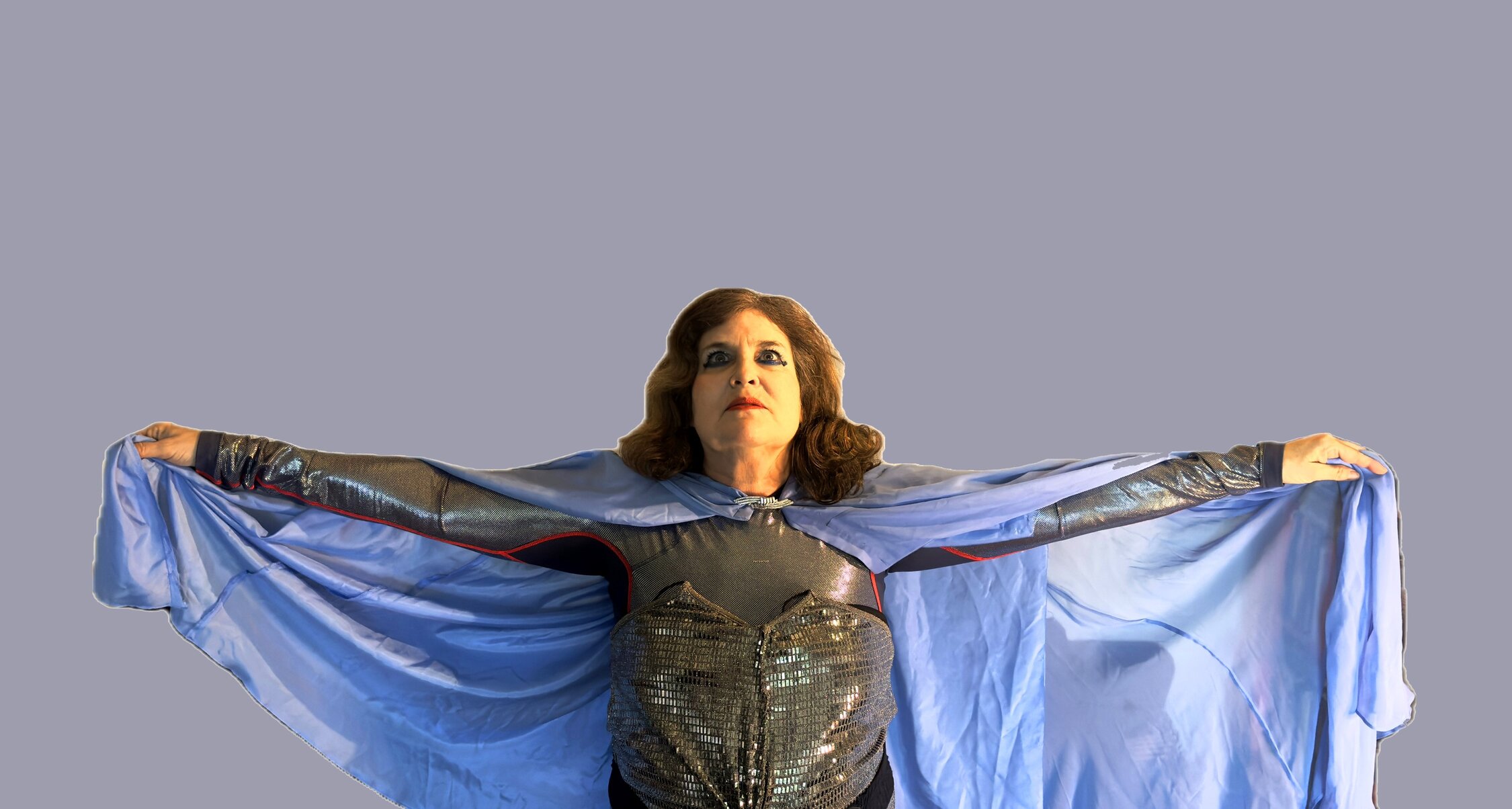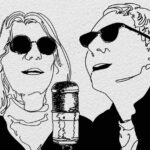
Azalia Snail as photographed by Dan West
In a world often besieged by negativity, Azaila Snail emerges as a beacon of light, utilising her latest single, ‘Zap You of That Hate’, as a vehicle for positive change. In her interview with Jason Barnard, she reveals the inspiration behind her music and the deeper meaning embedded within her latest album, ‘POWERLOVER’.
Can you tell us about the inspiration behind your latest single, ‘Zap You of That Hate’? How do you see music as a tool for addressing societal issues like hate and intolerance?
I think it’s always important for artists to not only express themselves, but to attempt to fire up feelings to relinquish the negative aspects of human behavior. As it sadly appears, we are constantly battling evil over good, and since artists have (or ideally should have) extra sensitivity, I feel it is pertinent to try to combat these evil urges as much as possible.
‘Zap You of That Hate’ has a very uplifting and transcendent vibe despite its serious message. How did you approach balancing the tone of the song with its lyrical content?
The contrast of the abrupt, syncopated chords and the other part of the song ~ the melodic spacious omnichords along with Alan Sparhawk’s layered, gorgeous guitar parts ~ definitely offers a feeling of overriding evil forces. As the song propels, it becomes a transcendent psychedelic hymn. As one can hear, the only lyrics of the entire album are the words “zap you of that hate.”
Can you share any insights into the visual elements of your music, such as the collages and imagery used in the ‘Zap You of That Hate’ video?
Since the beginning of my foray into musical endeavors, I’ve also been shooting visuals. First, it was with super eight film and then of course graduating to video camcorders, and now with the easy technology from an iPhone, one can easily shoot a multitude of images every day. I’m always looking at the world with the propensity of wanting to capture as many beautiful and fascinating images as I can. And then I assemble the clips into the computer and use layers and effects in a similar manner as I do in music production.
POWERLOVER is described as an ode to Brian Eno’s ambient soundscapes. What drew you to explore this particular sonic territory?
I’ve always absolutely loved Brian Eno’s early works, especially the first four albums which I think is some of the most alluring music ever made. I can’t even count how many times I fell happily asleep to the remarkable Apollo album. What an extraordinary way to sail into dreamland!
In what ways do you think instrumental music allows for a deeper emotional connection with listeners, especially in conveying themes like uneasiness and hope?
I’m not sure if it is a deeper connection for everybody, but it certainly does have a special feeling for me. And of course it depends on what the instrumental music is ~ there is certainly a lot of mediocre instrumental music such as elevator music or other corny stuff that doesn’t quite do it for me! (Kenny G!) If this album is successful in bringing people deep emotion and reflection, then I have done my duty!
‘Don’t Get Too Close To Me’ is described as conveying the feeling of impending doom in a world affected by a pandemic and the rise of AI. How did you translate these complex themes into instrumental music?
I composed music early on that can be scary sounding I suppose… for example , there are a few films by Chris Fieri that have used some of that music to great advantage. I’ve always created music that is a bit odd to say the least! I just can’t help it as that is what I hear in my head and I seek to put it out into the universe in that way. And I must mention that Dan’s expert bass playing is a big part of this album and is especially intense on that song!
Could you walk us through your creative process for composing and producing an all-instrumental album?
Ever since I was given my first omnichord around the turn of the century, it has given me vast and expansive territory in composing the exact kind of music I’ve wanted to play since the beginning of my musical explorations. I love spacious layers and a cool, organic sounding rhythm machine and melodious textural sonic additives. I created the pieces at home initially during the pandemic and then about a year or so ago I went into the studio with Adam Lasus. Dan West joined me in playing his stellar bass parts on all the songs plus piano on “Expert Outlier.”
How was the experience of collaborating with Alan Sparhawk of Low and Dan West, how did they shape the overall sound and direction?
I was lucky enough to meet Alan Sparhawk just at the beginning of LOW, actually their first ever performance outside of Minnesota. We became fast friends and played quite a few shows together from the early 90s until a few years ago. He was kind enough to do a remix of “Field Rep” on my last album Neon Resistance (produced by Dan West.) I knew I wanted to keep this album very simple, but there was one song in particular “Zap You of That Hate” that I could imagine his sonic and melodious guitar on. My heart was and is still so heavy over the passing of his life partner and musical comrade, Mimi Parker. I knew that it was important for him to stay busy and to keep creating, and so I decided to ask him to contribute to the song. I also know his philosophy and political feelings are very much on par with what I believe. I felt like he gave it just the right touch and I am forever grateful.
Dan West, as my life partner and frequent collaborator, was essential to the purpose of this record with his incredible bass playing. That was an absolute no-brainer! The drive and pulse of every song is powered by the basic elements of the omnis, but made stronger by his extraordinary bass parts. Your audience is probably familiar with his excellent band Sidewalk Society and his amazing solo work as d’Animal.
POWERLOVER is your 15th solo album. How do you feel your music and creative process have evolved?
I’ve definitely become a technically better musician while also staying quite untrained and very improvisatory. I try not to play too much as I want to feel completely spontaneous and inspired when I do pick up my instruments. That also has to with my lack of discipline! I think I have said this in interviews before, but I always think of my old hippie friend from the Wiltshire area of England, who said, something to the effect of: “One must have pauses in your creative life in which to fill up the reservoir!”
Can you share any memorable moments or lessons learned from touring with artists like Sebadoh, Sonic Youth and Pavement?
That’s quite a loaded question as it would take me an entire book to tell those tales (and I’m actually working on my memoir now, but it’s taking an exceedingly long time!) but I will say that being in New York City in the 80s and 90s was a remarkable education in the arts, in survival of the fittest, in learning the ropes, and therefore learning to fly. Therefore, a great place for both a soft and hard bloom! By the way, I only toured with Sebadoh one time on the East Coast and never with Sonic Youth or Pavement, but I did have a marvelous time playing harmonica for the great young British band Huggy Bear when they opened for both Pavement and Sonic Youth at the Brixton Academy in London. I always had a blast on tour, even if it was a bit rough at times!
What do you hope listeners take away from POWERLOVER after experiencing the album in its entirety?
Well, I think it’s a pretty good album for doing housework and for driving as it can allow the mind to wander freely without the restrictions of lyrics. I’m hoping they will appreciate the sonic journey and that it inspires them to create their own explorations if not in music, then into nature or wherever place that takes their souls to higher heights!




